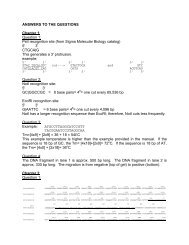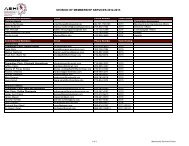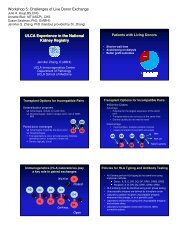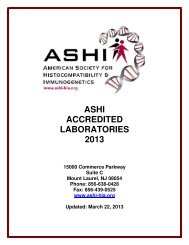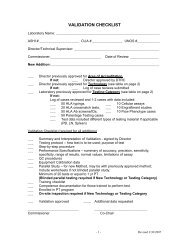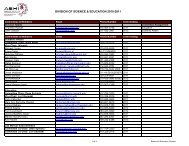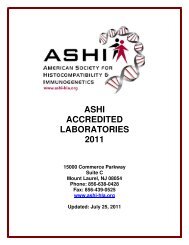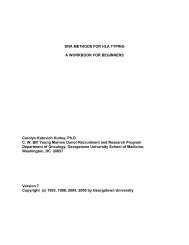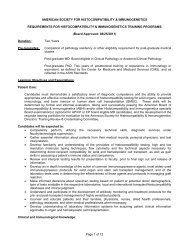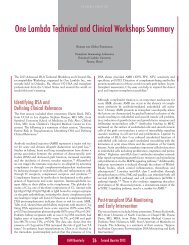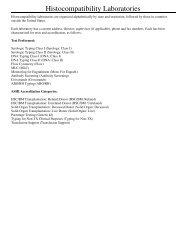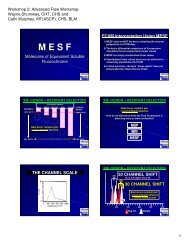69-PSENSITIZATION BY HLA-C CAN RENDER HLA-B ANTIGENS AS UNACCEPTABLEMISMATCHES.Marilyn Marrari, Rene J. Duquesnoy. Transplant Pathology, University of Pittsburgh Medical Center,Pittsburgh, PA, USA.Aim: Recent reports have shown that anti-HLA-C antibodies (Abs) are associated with rejection and graftfailure. DNA-based methods can accurately determine HLA-C types, and sensitive screening assays such asLuminex can identify HLA-C Abs. HLA-C antigens (Ags) display considerable amino acid polymorphismthat can be translated into a structurally defined epitope repertoire. HLAMatchmaker can be used toidentify donor-specific Ab reactivity patterns against mismatched critical components of epitopes (eplets)found on HLA-C Ags.Methods: We analyzed Ab reactivity patterns in sera from patients mismatched <strong>for</strong> HLA-C with rejectedrenal transplants that were screened in Luminex assays using class I single allele beads. Specificabsorptions were per<strong>for</strong>med using microbeads bearing single class I alleles and eluates were tested byLuminex.Results: We recently reported a case of sensitization of a B*4403 patient to the 156DA epitope on anHLA-Cw*0704 mismatch which led to Abs reacting with the 156DA epitope-carrying B*4402 allele andother HLA-B Ags, including B*0801, B*3701, B*4101, B*4201, B*4501 and B*8201 (Hum Immun 71:176-8, <strong>2010</strong>). We report here four more cases whereby absorption/elution assays clearly demonstrate thatAbs induced by a HLA-C mismatch reacted with epitopes shared with HLA-B Ags:[table1]Conclusions: Our findings demonstrate the importance of HLA-C mismatching in humoralallosensitization. Some HLA-C Abs are specific <strong>for</strong> epitopes shared with HLA-B Ags which then becomeunacceptable mismatches although the patient may have never been exposed to them. HLAMatchmaker isuseful in understanding donor-specifc Ab reactivity patterns and the determination of HLA mismatchacceptability <strong>for</strong> transplantation.70-PAUTOANTIBODIES AGAINST NUCLEOLIN IN KIDNEY TRANSPLANT RECIPIENTS.Zhiqiang Qin 1 , Bhavna Lavingia 2 , Yizhou Zou 1 , Peter Stastny 1,2 . 1 Internal Medicine - TransplantImmunology, UT Southwestern Medical Center, Dallas, TX, USA; 2 Pathology, UT Southwestern MedicalCenter, Dallas, TX, USA.Aim: Nucleolin is expressed on the surface of endothelial cells in the course of angiogenesis.Autoantibodies against nucleolin have been previously described in patients with chronic graft-versus-hostdisease.We investigated antibodies from kidney transplant recipients which react with endothelial cells.Methods: Sera from 50 kidney transplant recipients were investigated <strong>for</strong> antibodies against humanumbilical vein endothelial cells (HUVEC). One serum was used <strong>for</strong> immunoprecipitation and proteinidentification. Presence of nucleolin was confirmed with a nucleolin-specific monoclonal antibody.Nucleolin isolated from endothelial cell lysates was used <strong>for</strong> analysis of patient sera by Western blotting.The effect of antibodies against nucleolin on HUVEC was studied by assessing cell proliferation, apoptosisand in vitro tube <strong>for</strong>mation.Results: Antibodies against nucleolin identified a band of approximately 1<strong>00</strong> kDa by SDS-PAGE. Resultsof mass spectrometry showed that sequences of nucleolin were identified. We tested 50 sera obtained fromkidney transplant recipients after rejection and found that 7 (14%) had antibodies against nucleolinenrichedpreparations obtained from endothelial cell lysates by Western blot analysis. The frequency ofsuch antibodies should be higher if a more sensitive assay is used. After incubation with antibodies againstnucleolin the number of HUVEC was decreased, possibly by apoptosis. Tube <strong>for</strong>mation by endothelial cellsin vitro was inhibited.Conclusions: Autoantibodies against nucleolin were identified in kidney transplant recipients who hadrecently undergone immunological rejection of their allografts. Such antibodies have previously beenreported in bone marrow transplant recipients with chronic graft-versus-host-disease. The potential role ofthese autoantibodies in organ allograft rejection is suggested by their effect on angiogenesis and inhibitionof endothelial cell proliferation.71-P
ATG INTERFERNCE IN SINGLE ANTIGEN LUMINEX TESTING: TO TREAT OR NOT TOTREAT.Marilyn Wetmore, Patricia Kimble, Michael Moritz, Robert Cirocco. HLA Laboratory, Lehigh ValleyHealth Network Hospital, Allentown, PA, USA.Aim: This study was conducted to determine if Anti Thymocyte Globulin (ATG) interferes with the meanintensity fluorescence (MFI) generated by the Single Antigen (SA) Luminex anti-HLA bead array. ATG isgiven as an induction agent to inhibit lymphocyte activation at the time of renal transplantation. It is presentin the sera <strong>for</strong> up to one month after administration. De novo antibody may not be observed in the SA if theinduction agent ATG masks low level production of anti-donor HLA antibodies. A similar study reportedno affects of ATG on the haplotype or ID kit sensitivity and specificity.Methods: Seven sera samples from post transplant patients treated with ATG were absorbed twice withSheep anti-Rabbit IgG Dynabeads® M-280 (Invitrogen, Deer Park, WI). The same sera samples were DTTtreated and run in parallel <strong>for</strong> the presence of both class I and class II antibodies by SA Luminex assay. Thepatients received ATG on day 0,3 and 5 post transplant. Each sample was tested be<strong>for</strong>e and after DTTtreatment and absorption with (Sheep anti-Rabbit IgG) Dynabeads® M-280.Results: The positive control value increased 1.5 times after treatment with DTT or M-280 over that of theuntreated sera. The negative control value is approximately the same after M-280 treatment and 1.5 timeshigher with DTT treatment Than that of the untreated sera. The PC/NC ratio is 1.2 times higher after DTTtreatment and 1.6 times higher after M-280 treatment. Most of the samples run had more antibodyspecificities identified after DTT treatment.Conclusions: After reviewing the data it is apparent that ATG does inhibit the MFI in SA assay. Aftertreatment with DTT and M-280 a modest increase in the average MFI is noted. In addition, DTT treatmentincreases the MFI of the positive controls and may increase the specifity of the assay. In conclusion, thetreatment of post transplant serum samples with DTT is effective and recommended.72-PEARLY DETECTION AND REDUCTION OF DONOR SPECIFIC ANTIBODY (DSA) IN POSTLUNG TRANSPLANT PATIENTS.Patricia Willey 1 , D. Phelan 1 , R. Hachem 2 , E. Trulock 2 , T. Mohanakumar 2 . 1 HLA Laboratory, Barnes-Jewish Hospital, St. Louis, MO, USA; 2 Dept. of Surgery, Washington University School of Medicine, St.Louis, MO, USA.Aim: Early detection of DSA (ratio ≥ 0.2) by Luminex Single Antigen (Lum SA) and subsequent treatmentof DSA lead to reduction and in some cases, total elimination of DSA.Methods: 556 post lung transplant (tx) patients; 490 living, 66 deceased were analyzed. Of 490 living, 164(34.1%) developed DSA. Of 66 deceased, 38 (57.62%) had DSA. Adult patients do not receive tx acrossknown DSA. In 2<strong>00</strong>8, patients were protocol screened at 1, 3, 6 and 12 month intervals by Lum SA. Upondetection of DSA, treatment was initiated which included one dose Rituximab and six doses IvIg. 50% ofliving patients with DSA did well while the remaining had some degree of decreased lung function.Transplants ranged from 1992 to present, the majority since 2<strong>00</strong>3.Results: Defined DSA is predominantly Class II, with the majority DQB*. With improved screeningmethods, DQB* identified in the past now includes DQA* antibodies. Of patients with DQB* antibodiesoriginally identified, n=60 (36.6%) have been redefined as DQA*. Class I antibodies are defined in anaverage of only 8.9% of recipients. Lum SA ratio were similar <strong>for</strong> all groups. Of living patients with DSAdetected in the first month, 48 of 71 or 67.6% totally eliminated their DSA post anti-rejection treatment.Subsequent screens showed the sustained absence of DSA. In contrast, only 10.5% of the patients who diedwere able to reduce or eliminate DSA. Delayed identification and/or treatment may very well be factors inour inability to eliminate DSA resulting in loss of graft.[table1]Conclusions: Improved detection methods and treatment at an early stage are beneficial in eliminatingDSA in post lung tx patients potentially decreasing the prevalence of chronic rejection.73-PPRELIMINARY DATA OF PCR-BASED CUSTOM ARRAY FOR ACUTE CELLULARREJECTION AFTER LIVER TRANSPLANTATION.
- Page 1 and 2: Monday, September 27, 20102:00 PM -
- Page 3 and 4: 5-ORTWO CASES OF DONOR SPECIFIC ANT
- Page 5 and 6: Monday, September 27, 20102:00 PM -
- Page 7 and 8: Results: PHA-induced mRNA expressio
- Page 9 and 10: conjugated IgM (BD Biosciences), Ig
- Page 11 and 12: Methods: Peripheral blood and endom
- Page 13 and 14: Aim: NK cells have an established r
- Page 15 and 16: Methods: Sera (n=22) were tested fo
- Page 17 and 18: expression on lymphocytes, we hypot
- Page 19 and 20: Conclusions: Clean SA beads can eli
- Page 21 and 22: goal is to re-examine our previous
- Page 23 and 24: Aim: There is increasing evidence t
- Page 25 and 26: esult in poor graft survival. The g
- Page 27 and 28: Aim: Pronase treatment eliminates i
- Page 29 and 30: 34-PCLINICAL AND PATHOLOGICAL SIGNI
- Page 31 and 32: Nabil Mohsin, Isabelle G. Wood, Ind
- Page 33 and 34: donor/recipient pairs for transplan
- Page 35 and 36: and tested in the DynaChip assay fo
- Page 37 and 38: average difference between Ave and
- Page 39 and 40: Conclusions: The XM-One assay can b
- Page 41 and 42: 59-PCYTOTOXIC AND NON-CYTOTOXIC ANT
- Page 43 and 44: data suggests that DTT pretreatment
- Page 45: Bhavna Lavingia 1 , Chantale Lacell
- Page 49 and 50: 75-PPREFORMED LOW REACTIVE ANTI-HLA
- Page 51 and 52: Sabarinathan Ramachandran 1 , Naohi
- Page 53 and 54: 83-PALLELIC DIVERSITY OF KIR2DL4 AN
- Page 55 and 56: São Paulo, Brazil; 3 Commissariat
- Page 57 and 58: 91-PCHARACTERIZATION OF COMMON AND
- Page 59 and 60: Conclusions: The extensive diversit
- Page 61 and 62: 99-PPOTENTIAL COMMON NOVEL ALLELES
- Page 63 and 64: 103-PTOWARDS A FUNCTIONAL HLA-DPB1
- Page 65 and 66: 107-PWHOLE GENOME AMPLIFICATION (WG
- Page 67 and 68: 111-PLOSS OF MISMATCHED HLA IN FAMI
- Page 69 and 70: 115-PDONOR EPITHELIAL CELL CHIMERIS
- Page 71 and 72: Caucasian patients. MRs vary signif
- Page 73 and 74: Results: We obtained the total No.
- Page 75 and 76: cord blood and platelet transfusion
- Page 77 and 78: 131-PASSOCIATION OF IL-2-330(G/T) W
- Page 79 and 80: Institute, Children’s Hospital Oa
- Page 81 and 82: Methods: To prove the robustness of
- Page 83 and 84: populations.We studied the involvem
- Page 85 and 86: amplicons generated from different
- Page 87 and 88: Results: The sequence of the unexpe
- Page 89 and 90: concentration of the Taq Polymerase
- Page 91 and 92: 160-PASSOCIATION OF HAPLOTYPES WITH
- Page 93 and 94: 164-PDETECTION OF A DE NOVO DONOR S
- Page 95 and 96: 168-PA NOVEL HLA-DQB1 ALLELE CONFIR
- Page 97 and 98:
172-PSCREENING FOR HLA-SPECIFIC ALL
- Page 99 and 100:
176-PIMPLEMENTATION OF THE WORLD HE
- Page 101 and 102:
epertoire of displayed ligands and
- Page 103 and 104:
mucosa. No other samples were avail
- Page 105 and 106:
Conclusions: In previously reported
- Page 107 and 108:
Conclusions: Our findings can demon
- Page 109 and 110:
Conclusions: In analyzing this data
- Page 111 and 112:
examined on microarrays from a huma
- Page 113 and 114:
Methods: Serial analysis of sera ob
- Page 115 and 116:
Conclusions: These new technologies
- Page 117 and 118:
allograft injury. Four of these 18
- Page 119 and 120:
A NOVEL HLA CLASS I SINGLE ANTIGEN
- Page 121 and 122:
Results: Approximately twice as man
- Page 123:
Methods: Molecular HLA typing was p



